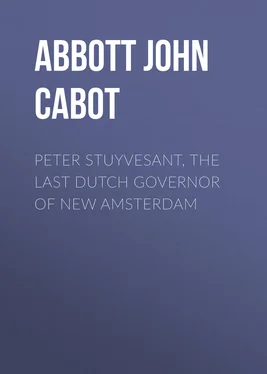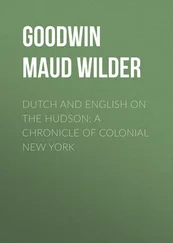John Abbott - Peter Stuyvesant, the Last Dutch Governor of New Amsterdam
Здесь есть возможность читать онлайн «John Abbott - Peter Stuyvesant, the Last Dutch Governor of New Amsterdam» — ознакомительный отрывок электронной книги совершенно бесплатно, а после прочтения отрывка купить полную версию. В некоторых случаях можно слушать аудио, скачать через торрент в формате fb2 и присутствует краткое содержание. Жанр: foreign_prose, История, foreign_edu, foreign_antique, на английском языке. Описание произведения, (предисловие) а так же отзывы посетителей доступны на портале библиотеки ЛибКат.
- Название:Peter Stuyvesant, the Last Dutch Governor of New Amsterdam
- Автор:
- Жанр:
- Год:неизвестен
- ISBN:нет данных
- Рейтинг книги:3 / 5. Голосов: 1
-
Избранное:Добавить в избранное
- Отзывы:
-
Ваша оценка:
- 60
- 1
- 2
- 3
- 4
- 5
Peter Stuyvesant, the Last Dutch Governor of New Amsterdam: краткое содержание, описание и аннотация
Предлагаем к чтению аннотацию, описание, краткое содержание или предисловие (зависит от того, что написал сам автор книги «Peter Stuyvesant, the Last Dutch Governor of New Amsterdam»). Если вы не нашли необходимую информацию о книге — напишите в комментариях, мы постараемся отыскать её.
Peter Stuyvesant, the Last Dutch Governor of New Amsterdam — читать онлайн ознакомительный отрывок
Ниже представлен текст книги, разбитый по страницам. Система сохранения места последней прочитанной страницы, позволяет с удобством читать онлайн бесплатно книгу «Peter Stuyvesant, the Last Dutch Governor of New Amsterdam», без необходимости каждый раз заново искать на чём Вы остановились. Поставьте закладку, и сможете в любой момент перейти на страницу, на которой закончили чтение.
Интервал:
Закладка:
Another party of five men, was sent to examine the northern shore of the bay. They probably inflicted some gross outrage upon the natives, as the crew of the Half Moon had conducted infamously, at other points of the coast, where they had landed, robbing and shooting the Indians. The sun had gone down, and a rainy evening had set in, when two canoes impelled rapidly by paddles, overtook the returning boat. One contained fourteen Indians; the other twelve. Approaching within arrow shot, they discharged a volley into the boat. One of these keen-pointed weapons, struck John Coleman in the throat, and instantly killed him. Two other Englishmen were wounded.
The Indians seemed satisfied with their revenge. Though they numbered twenty-six warriors, and there were but two white men left unwounded, the savages permitted them to continue their passage to the vessel, without further molestation. The journalist, who records this assault, is silent respecting the provocation which led to it.
Hudson was alarmed by this hostility, and expected an immediate attack upon the ship. He promptly erected bulwarks along the sides of his vessel as a protection from the arrows of the fleet of war canoes, with which, he supposed, he would be surrounded the next morning.
But the night passed quietly away; the morning dawned, and a few canoes approached from another part of the bay, with no signs of hostility. These peaceful Indians had manifestly heard nothing of the disturbance of the night before. They came unarmed, with all friendly attestations, unsuspicious of danger, and brought corn and tobacco, which they offered in exchange for such trinkets as they could obtain. The next morning, two large canoes approached from the shores of the bay which was many leagues in extent, one of which canoes seemed to be filled with warriors, thoroughly armed. The other was a trading boat.
It is probable that those in the war canoe, came as a protection for their companions. It is hardly conceivable that the Indians, naturally timid and wary, could have thought, with a single war canoe containing scarcely a dozen men, armed with arrows, to attack the formidable vessel of Sir Henry Hudson, armed, as they well knew it to be, with the terrible energies of thunder and lightning.
The Indians were so unsuspicious of danger, that two of them unhesitatingly came on board. Sir Henry, we must think treacherously, seized them as prisoners, and ordered the canoes containing their companions, to keep at a distance. Soon another canoe came, from another direction, with only two men in it. Sir Henry received them both on board, and seized them also as prisoners. He intended to hold them as hostages, that he might thus protect himself from any hostility on the part of the natives.
One of these men upon finding himself a captive, leaped overboard and swam ashore. Sir Henry had now three prisoners and he guarded them very closely. Yet the natives, either from policy or from fear, made no hostile demonstrations against him.
The half Moon remained in the outer bay nine days. Several exploring tours had been sent out, visiting what is now known as the Jersey shore. None of these, with the exception of the one to which we have alluded, encountered any hostility whatever from the natives.
On the 11th of September, Hudson sailed through the Narrows, and anchored in the still and silent waters of New York harbor. These waters had never then been whitened by a sail, or ploughed by any craft larger than the Indian's birch canoe. The next morning, the 12th of September, Sir Henry again spread his sails, and commenced his memorable voyage up the solitary river, which has subsequently borne his name. Only here and there could a few wigwams be seen, scattered through the forest, which fringed its banks. But human life was there, then as now, with the joys of the bridal and the grief of the burial. When we contemplate the million of people, now crowded around the mouth of the Hudson, convulsively struggling in all the stern conflicts of this tumultuous life, it may be doubted whether there were not as much real happiness in the wigwam of the Indian as is now to be found in the gorgeous palace of the modern millionaire. And when we contemplate the vices and the crimes which civilization has developed, it may also be doubted whether, there were not as much virtue, comparatively with the numbers to be found, within the bark hut of the red man, as is now to be found in the abodes of the more boastful white man.
Sir Henry Hudson hoped to find this majestic river, inviting him into unknown regions of the north, to be an arm of the sea through which he could cross the continent to the shores of the Pacific. It was not then known whether this continent were a few miles or thousands of miles in breadth. For the first two days the wind was contrary, and the Half Moon ascended the river but about two miles. The still friendly natives paddled out from the shores, in their bark canoes in great numbers, coming on board entirely unarmed and offering for sale, excellent oysters and vegetables in great abundance.
On the third day a strong breeze sprang up from the southeast. All sail was set upon the Half Moon. It was a bright and beautiful autumnal day. Through enchanting scenery the little vessel ploughed the waves of the unknown river, till, having accomplished forty miles, just at sunset they dropped their anchor in the still waters which are surrounded by the grand and gloomy cliffs of the Highlands.
The next morning, the river and its shores, were enveloped in a dense fog, so that one could see but a few yards before him. Taking advantage of this, the Indian captives, whom Sir Henry Hudson had so treacherously ensnared, leaped out of one of the port-holes, and swam ashore. As soon as they reached the land, they raised loud shouts of hatred and defiance.
The sun soon dispelled the fog, and the voyage was continued, and by night the Half Moon reached a point supposed to be near the present site of Catskill Landing. The natives were numerous, and very friendly. They came freely on board, apparently unsuspicious of danger. It was noticeable that there were many very aged men among them. The river seemed full of fishes, and with their hooks they took large numbers. The next day the Indians came on board in crowds, bringing pumpkins and tobacco. The vessel's boats were sent on shore to procure fresh water.
Early the ensuing morning, they pushed up the river five miles, to a point probably near the present city of Hudson.
Sir Henry Hudson does not appear to advantage in the account transmitted to us of this exploration. Mr. Sparks, in his American Biography, gives the following extraordinary account of one of his procedures.
"It is evident that great distrust was entertained by Hudson and his men towards the natives. He now determined to ascertain, by intoxicating some of the chiefs, and thus throwing them off their guard, whether they were plotting any treachery. He accordingly invited several of them into the cabin, and gave them plenty of brandy to drink. One of these men had his wife with him, who, the Journal informs us, 'sate so modestly as any of our countrywomen would do in a strange place.' But the men had less delicacy and were soon quite merry with the brandy.
"One of them, who had been on board from the first arrival of the ship, was completely intoxicated, and fell sound asleep, to the great astonishment of his companions, who probably feared that he had been poisoned; for they all took to their canoes and made for the shore, leaving their unlucky comrade on board. Their anxiety for his welfare soon induced them to return; and they brought a quantity of beads, which they gave him, perhaps to enable him to purchase his freedom from the spell which had been laid upon him.
"The poor savage slept quietly all night, and when his friends came to visit him the next morning they found him quite well. This restored their confidence, so that they came to the ship again in crowds, in the afternoon, bringing various presents for Hudson. Their visit which was one of unusual ceremony is thus described in the Journal:
Читать дальшеИнтервал:
Закладка:
Похожие книги на «Peter Stuyvesant, the Last Dutch Governor of New Amsterdam»
Представляем Вашему вниманию похожие книги на «Peter Stuyvesant, the Last Dutch Governor of New Amsterdam» списком для выбора. Мы отобрали схожую по названию и смыслу литературу в надежде предоставить читателям больше вариантов отыскать новые, интересные, ещё непрочитанные произведения.
Обсуждение, отзывы о книге «Peter Stuyvesant, the Last Dutch Governor of New Amsterdam» и просто собственные мнения читателей. Оставьте ваши комментарии, напишите, что Вы думаете о произведении, его смысле или главных героях. Укажите что конкретно понравилось, а что нет, и почему Вы так считаете.












